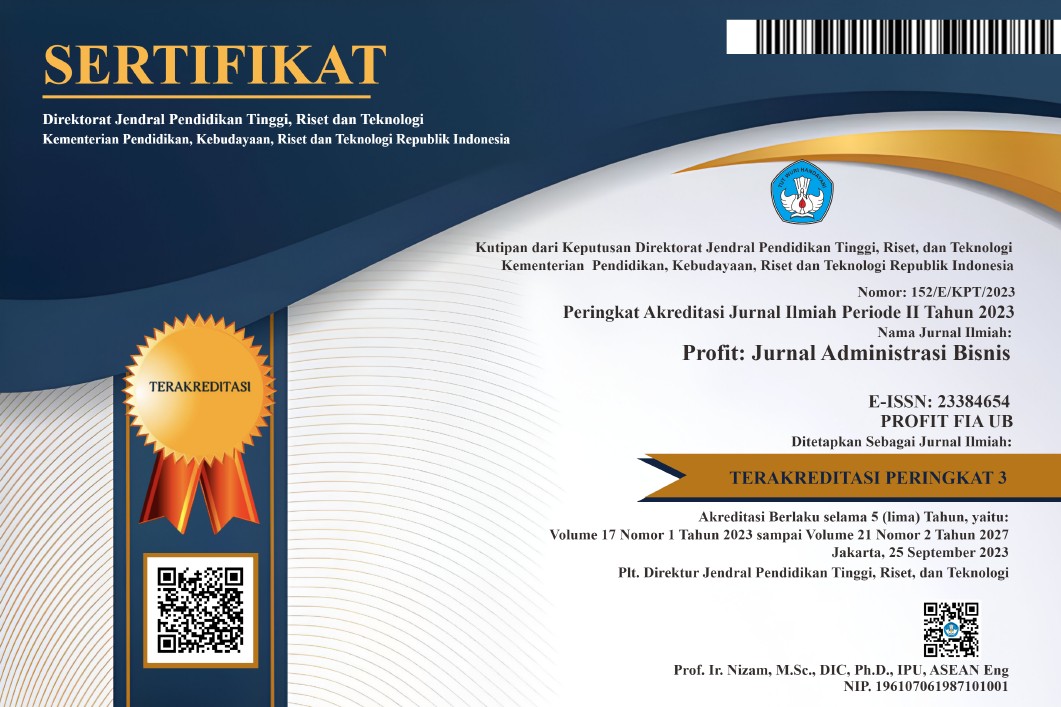PENGARUH ENVIRONMENTAL RISK TERHADAP KINERJA KEUANGAN PERUSAHAAN (Studi pada perusahaan-perusahaan di Indonesia, Singapura, Malaysia, Thailand, Filipina dan Vietnam)
DOI:
https://doi.org/10.21776/ub.profit.2019.013.02.2Keywords:
environmental risk, Profitability, Companies Value, ASEAN countriesAbstract
The purpose of this study was to find out how the influence of environmental risk on profitability and the value of companies that are publicly listed on stock exchanges in Indonesia, Malaysia, Singapore, Thailand, the Philippines and Vietnam. This study uses secondary data for all variables, namely utilizing data from Osiris Financial Database, which includes 558 companies from these six countries. The results of the study show that environmental risk is not proven to affect financial performance, both for accounting or market-based financial indicators in Indonesia, Malaysia, Singapore, Thailand and the Philippines. Environmental risk proved to significantly affect Price to Earnings Ratio in Vietnam, both in testing univariate and multivariate regression models with several control variables. However, in multivariate testing by including control variables, it is evident that environmental risk has a real impact on achieving ROA in Singapore and Thailand, on ROE in Malaysia and Vietnam, on PER in Thailand and Vietnam, and Tobin's Q on companies in Indonesia, Malaysia, and Thailand. Multivariate testing with combined data from six countries shows that environmental risk together contributes significantly to achieving ROA and PER. Control variables that contribute to the significant influence are industry type, country of origin, and size of the company.
Â
References
Coulson, A. B., & Dixon, R. (1995). Environmental risk and management strategy: the implications for financial institutions. International Journal of Bank Marketing, 13(2), 22-29.
Christmann, P. (2000, August). Effects of "Best Practices" of environmental management on cost advantage: The role of complementary assets. The Academy of Management JOurnal, 43(4), 663-680.
de Burgos-Jimenez, J., Vazquez-Brust, D., Plaze-Ubeda, J. A., & Dijkshoorn, J. (2013). Environmental protection and financial performance: An empirical analysis in Wales. International Journal of Operations & Production Management, 33(8), 981-1018.
Man, L. W. (2010). Corporate environmentalism and environmental strategies: The relationship between resources, capabilities, strategies and performance in China's Pearl River Delta. The Hong Kong Polytechnic University, Department of Management and Marketing. Hong Kong: The Hong Kong Polytechnic University.
Russo, M. V., & Fouts, P. A. (1997, June). A resource-based perspective on corporate environmental performance and profitability. The Academy of Management Journal, 40(3), 543-559.
Said, A. A., HassabElnaby, H. R., & Wier, B. (2003). An empirical investigation of the performance consequences of nonfinancial measures. Journal of Management Accounting Research, 15, 193-223.
Wong, A. (2014). Corporate sustainability through non-financial risk management. Corporate Governance, 14(4), 575-586.
Downloads
Published
Issue
Section
License
The copyright of the received article shall be assigned to the journal as the publisher of the journal. The intended copyright includes the right to publish the article in various forms (including reprints). The journal maintains the publishing rights to the published articles.

This work is licensed under a
Creative Commons Attribution-NonCommercial 4.0 International License

















